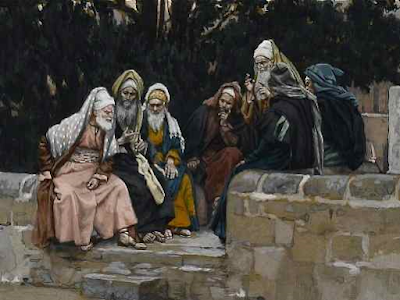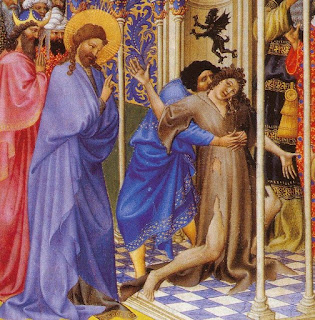How did the people of Nazareth, in the Gospel today, go from amazement and hope in Jesus’ announcement that he was the Messiah, to murderous fury? That’s certainly the big question, isn’t it? What happened? Was it something that Jesus said? Hope do you explain hope and amazement transforming into doubt and then hatred?
I thought to myself, is there anything that I could say, that could elicit such a response? If I told a bad joke, there would likely be a few groans. Like, how much does a pirate pay for corn? A buccaneer. If I gave my prediction about who will win the superbowl, there might be a few scoffs, but you wouldn’t run me out of Church. If, instead of preaching on a theological topic, I simply talked about my favorite movies from the last year and sit down, you might stare at me quizzically, but you wouldn’t come at me with murderous intent.
Things might get a little bit more heated if I, say, spent the homily sharing my incredibly niche and polarizing political opinions. I don’t know how this parish reacted, but I remember in my first assignment, when the bishop had us read his statement on the HHS mandate which was to force Catholic institutions to pay for medical procedures contrary to Church teaching, we had a few mass goers walk out during the bishop’s message.
I came across a very telling article this week, that sited a study regarding the relationship between people’s political and religious beliefs. It claimed, that for a majority people, their political opinions take a higher priority than their religious ones, and that the Church they attend coincides more with their political beliefs than if that Church is purporting to preach the truth.
So, again, if during the homily, I got too political, well, that might elicit a response of sorts.
But what if I started preaching heresy? I starting making claims about the Nature of God, the efficacy of the Sacraments that were contrary to the ancient tradition of the Church. What if I belittled beloved devotions. Well, you should get angry, shouldn’t you. That should elicit jeers, letters to the bishop, calls for my removal as pastor. You don’t come to church to be lied to, to have the faith demeaned and disparaged. I should be removed, if I did that.
But it wasn’t a lie that caused the people of Nazareth to drive him to the edge of town to murder him. He wasn’t simply offering a bad joke or a divisive political opinion, though some may have interpreted his words in that way. Jesus was stating the truth. He was the Messiah.
And when his townsmen began to contemplate the implications of that truth, amazement turned to doubt and doubt turned to murderous hatred.
When we are presented with truth, truth about God, truth about ourselves, we have some choices to make, don’t we? For example, if I’m in the habit of stealing from supermarkets, and I am confronted with the truth that stealing is evil, as taught by our faith, I have a choice to make. Reject the truth outright, that I know better than the Church, I try to rationalize my sin, saying it’s not really stealing if I want it really bad, or quit stealing and confess my sin to God.
Another example, if I was under the impression that Eucharist was only a symbol of the Lord’s Body and Blood, but then I’m confronted with the unchanging truth about the Eucharist rooted in scriptures and evident in the church fathers including our own St. Ignatius, bishop of Antioch, I have a choice to make. Reject the truth, thinking I know better than 2000 years of consistent church teaching, I try to minimize the importance of the doctrine, saying to myself, it doesn’t really matter, does God really care if believe this or not?” Or, recognize I was wrong, the Church was right, Lord, help my unbelief, in the words of the man in Mark’s Gospel, wanting to believe that Jesus could cast the demon out of his possessed son.
There are a lot of reaction to Jesus in the Gospels. And those reactions are the consequences of choices, choices to believe in the truth about who Jesus says he is, or not.
The townsfolk of Nazareth, they discredit Jesus’ claim. He’s just the son of a carpenter. He can’t be the Messiah. They allowed their personal prejudices to hinder their ability to believe.
Then, when Jesus explains how their choice to discredit him was akin to the hardness of heart and lack of faith described in the old testament stories about Elijah and Elisha. Well, they had another choice. Recognize the pattern of their unbelief and the veracity of Jesus’ claim, or, silence him, drive him out, murder him. Rejection of the truth leads to violence.
Why is our culture so polarized, so ready to erupt into violence? In many places, in many homes, even in many so-called Christian communities, it is no longer rooted in the Truth. But Truth leads to love and peace. “Augustine says, nothing conquers but truth, and the victory of the truth is love.”
When we are rooted in truth, we are able to truly love. Love that is patient, kind, not jealous, not pompous, not inflated, not rude, not seeking its own interests, not quick-tempered, not brooding over injury, not rejoicing over wrongdoing but rejoicing with the truth., as St. Paul explains in our second reading today.
The townsfolk of Nazareth certainly did not rejoice with the truth, but Christians, we must. For, truth is the only firm foundation for culture. We understand this. We hate fake news because it’s the dissemination of lies. Pope Francis, this week spoke about how spreading “disinformation” about COVID-19 is a violation of human rights. He said access to accurate information, based on scientific data, is a human right that must be especially guaranteed for those who are less equipped to separate out the morass of misinformation and commentary masquerading as fact that is available online.
At the same time, Francis asked for a merciful, missionary approach to those who fall prey to such distortions so they are helped to understand the truth.
"Fake news has to be refuted, but individual persons must always be respected, for they believe it often without full awareness or responsibility," he said. "Reality is always more complex than we think and we must respect the doubts, the concerns and the questions that people raise, seeking to accompany them without ever dismissing them."
The Holy Father’s approach is consistent quite enlightened compared to the anger and vitriol you see from people on “both sides of the issue” . Seek the truth, don’t lie to people, don’t minimize people’s concerns, but also don’t overinflate your claims, don’t violate people’s consciences, but patiently help people identify misinformation.
Not one person in Nazareth stopped and said, “let’s listen to what he has to say, let’s entertain this possibility. If he is in error or a madman or a charlatan, the truth will be revealed.” No one was calm, rational, careful, or discerning. They jumped to discredit, and when they were challenged, they defended their prejudices with murderous intent.
May the Lord deliver us from our prejudices, those which keep us from loving God, loving our neighbor, loving the stranger, and loving ourselves, those which keep us from rejoicing always with the truth, for the glory of God and salvation of souls.

















